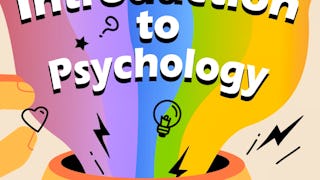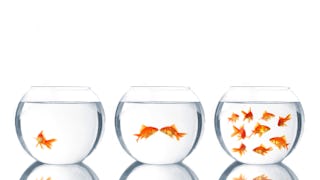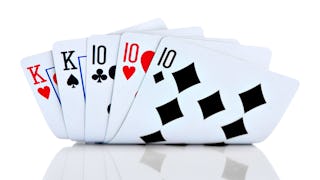This course introduces students to foundational areas in psychology across four key modules, including the biological basis of behavior, cognitive and emotional processes, theories of motivation and personality, and an introduction to psychological disorders. It offers students a basic yet comprehensive understanding of how psychological science explains thought, feeling, and behavior.

Läuft in 5 Tagen aus. Bringen Sie Ihre Karriere in Schwung mit Kursen von Google, IBM und mehr für £190/Jahr. Jetzt sparen.


Empfohlene Erfahrung
Was Sie lernen werden
Explain key psychological theories in biological, developmental, personality, and social domains.
Identify major figures and schools that shaped psychology as a scientific field.
Use the scientific method in psychology: form hypotheses, collect data, and analyze results.
Analyze study findings and relate them to real-life behavior and mental processes.
Kompetenzen, die Sie erwerben
- Kategorie: Psychology
- Kategorie: Mental Health Diseases and Disorders
- Kategorie: Social Sciences
- Kategorie: Human Development
- Kategorie: Biology
- Kategorie: Human Learning
- Kategorie: Statistical Analysis
- Kategorie: Scientific Methods
- Kategorie: Experimentation
- Kategorie: Correlation Analysis
- Kategorie: Research Methodologies
- Kategorie: Culture
- Kategorie: Learning Theory
- Kategorie: Research
Wichtige Details

Zu Ihrem LinkedIn-Profil hinzufügen
Juli 2025
8 Aufgaben
Erfahren Sie, wie Mitarbeiter führender Unternehmen gefragte Kompetenzen erwerben.

In diesem Kurs gibt es 5 Module
This course introduces students to foundational areas in psychology across four key modules, including the biological basis of behavior, cognitive and emotional processes, theories of motivation and personality, and an introduction to psychological disorders. It offers students a basic yet comprehensive understanding of how psychological science explains thought, feeling, and behavior. By examining essential psychological concepts and theories, students will begin to critically reflect on human behavior in various contexts. The course encourages the application of these insights to one’s own experiences, relationships, and broader social environments.
Das ist alles enthalten
2 Videos3 Lektüren
Psychology emerged as a scientific discipline in the late 19th century, evolving from philosophy and biology with pioneers like Wilhelm Wundt, who established the first psychology laboratory in 1879. Early theories included structuralism, focusing on introspection, and functionalism, which emphasized the purpose of behavior. Over time, various perspectives developed—such as behaviorism, psychoanalysis, humanism, cognitive psychology, and the biological approach—each offering unique insights into human thought and behavior. Today, psychology integrates these diverse theories to better understand mental processes and improve well-being across individuals and communities.
Das ist alles enthalten
5 Videos1 Lektüre2 Aufgaben
Psychology research relies on systematic methods to study behavior and mental processes. Observation involves watching and recording behavior in natural or controlled settings to identify patterns without interfering. Correlational research examines the relationship between two variables, helping to predict outcomes but not determine cause and effect. Experimental methods involve manipulating one variable (independent) to observe its effect on another (dependent), allowing researchers to draw conclusions about causality under controlled conditions.
Das ist alles enthalten
6 Videos1 Lektüre2 Aufgaben
The study of brain and behavior explores how biological processes influence thoughts, emotions, and actions, as well as the role of genetics (nature) versus environment (nurture) in shaping behavior. Neurons, the brain’s communication cells, transmit information through electrical impulses and chemical signals, forming complex networks that underlie all mental activity. The brain is made up of specialized structures, including lobes like the frontal (planning and decision-making), parietal (sensory processing), occipital (vision), and temporal (hearing and memory).
Das ist alles enthalten
5 Videos1 Lektüre2 Aufgaben
The psychology of emotion, motivation, and stress examines how people experience feelings, what drives their actions, and how they respond to challenges. Emotions are complex reactions involving physiological arousal, expressive behavior, and conscious experience, influenced by both brain structures like the amygdala and social context. Motivation refers to the internal processes that initiate, direct, and sustain behavior, with theories like Maslow’s hierarchy of needs and drive-reduction theory explaining different types of motivation. Stress occurs when individuals perceive demands as exceeding their coping abilities, triggering physiological responses that can impact both mental and physical health.
Das ist alles enthalten
5 Videos1 Lektüre2 Aufgaben
Erwerben Sie ein Karrierezertifikat.
Fügen Sie dieses Zeugnis Ihrem LinkedIn-Profil, Lebenslauf oder CV hinzu. Teilen Sie sie in Social Media und in Ihrer Leistungsbeurteilung.
Auf einen Abschluss hinarbeiten
Dieses Kurs ist Teil des/der folgenden Studiengangs/Studiengänge, die von O.P. Jindal Global Universityangeboten werden. Wenn Sie zugelassen werden und sich immatrikulieren, können Ihre abgeschlossenen Kurse auf Ihren Studienabschluss angerechnet werden und Ihre Fortschritte können mit Ihnen übertragen werden.¹
Dozent

Mehr von Psychology entdecken

National Taiwan University

Yale University

University of Toronto

Wesleyan University
Warum entscheiden sich Menschen für Coursera für ihre Karriere?





Neue Karrieremöglichkeiten mit Coursera Plus
Unbegrenzter Zugang zu 10,000+ Weltklasse-Kursen, praktischen Projekten und berufsqualifizierenden Zertifikatsprogrammen - alles in Ihrem Abonnement enthalten
Bringen Sie Ihre Karriere mit einem Online-Abschluss voran.
Erwerben Sie einen Abschluss von erstklassigen Universitäten – 100 % online
Schließen Sie sich mehr als 3.400 Unternehmen in aller Welt an, die sich für Coursera for Business entschieden haben.
Schulen Sie Ihre Mitarbeiter*innen, um sich in der digitalen Wirtschaft zu behaupten.
Häufig gestellte Fragen
Access to lectures and assignments depends on your type of enrollment. If you take a course in audit mode, you will be able to see most course materials for free. To access graded assignments and to earn a Certificate, you will need to purchase the Certificate experience, during or after your audit. If you don't see the audit option:
The course may not offer an audit option. You can try a Free Trial instead, or apply for Financial Aid.
The course may offer 'Full Course, No Certificate' instead. This option lets you see all course materials, submit required assessments, and get a final grade. This also means that you will not be able to purchase a Certificate experience.
When you purchase a Certificate you get access to all course materials, including graded assignments. Upon completing the course, your electronic Certificate will be added to your Accomplishments page - from there, you can print your Certificate or add it to your LinkedIn profile. If you only want to read and view the course content, you can audit the course for free.
You will be eligible for a full refund until two weeks after your payment date, or (for courses that have just launched) until two weeks after the first session of the course begins, whichever is later. You cannot receive a refund once you’ve earned a Course Certificate, even if you complete the course within the two-week refund period. See our full refund policy.
Weitere Fragen
Finanzielle Unterstützung verfügbar,
 enthalten
enthalten
